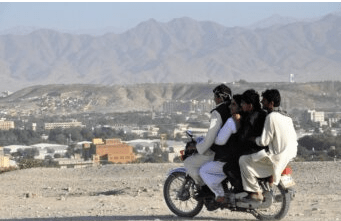
The image of an Afghan man pinned down to the ground with a police officer’s knee on his neck brought to light the agonising plight faced by Afghan refugees in Iran fleeing their war-ravaged country.
Identified as Seyed Mehdi Mousavi, a resident of Afghanistan’s Helmand province bordering Iran, the man became the latest victim of a massive crackdown in Iran against migrants and refugees as authorities in Tehran declare ‘war on illegal migrants’.
Mahdi Babolhavaeji, deputy governor of Tehran chose these words to glorify the crackdown: “In dealing with illegal residents, we are like our youth who took up arms and went to war, becoming martyrs.”
The country’s interior minister, Ahmad Vahidi, says that the government doesn’t plan to heed calls from human rights
groups to ensure a fair immigration policy.
This statement followed the state machinery mobilising relentlessly and mercilessly to arrest, persecute and forcefully deport thousands of refugees back to the war-ravaged country they fled, fearing life. To escape their responsibilities, the Iranian authorities have been constantly blaming the Afghan refugees for the declining economy law and order situation that has led to a public outrage and anger directed against the marginalised community.
Iran has also begun a massive $3 billion to seal the border with Afghanistan, which involves the construction of four-meter-high concrete walls and the installation of barbed wire and fences within three years. Conservative estimates suggest some 2000 Afghan refugees are forcibly getting deported daily back to the country facing the worst humanitarian crisis under the hardline Taliban regime.
Pakistan, the next immediate neighbour of Afghanistan, has been peddling the same policy of blaming and expelling the Afghan refugees.
Pakistan formally launched its crackdown back in October, blaming them for a surge in nationwide terrorist acts. Nearly 600,000 Afghans have returned to their home country, with Pakistani officials claiming “more than 95%” returned voluntarily.
The UN estimates that more than 1.5 million refugees have returned to
Afghanistan from Pakistan and Iran since January 2023. And, as per the United Nations Refugee Agency, Iran currently hosts around 3.4 million foreign refugees, with Afghans comprising the largest single group.
Under such circumstances, rights groups have been urging swiftly to create conditions conducive to voluntary repatriation to Afghanistan via land distribution for housing and agriculture in rural areas and job opportunities in the country’s urban centres.
However, because these refugees have been settled in the host countries for decades, their dignified settlement and path to possible citizenship, instead of making them a scapegoat and forcefully deporting them, could make lives much more accessible for all.






